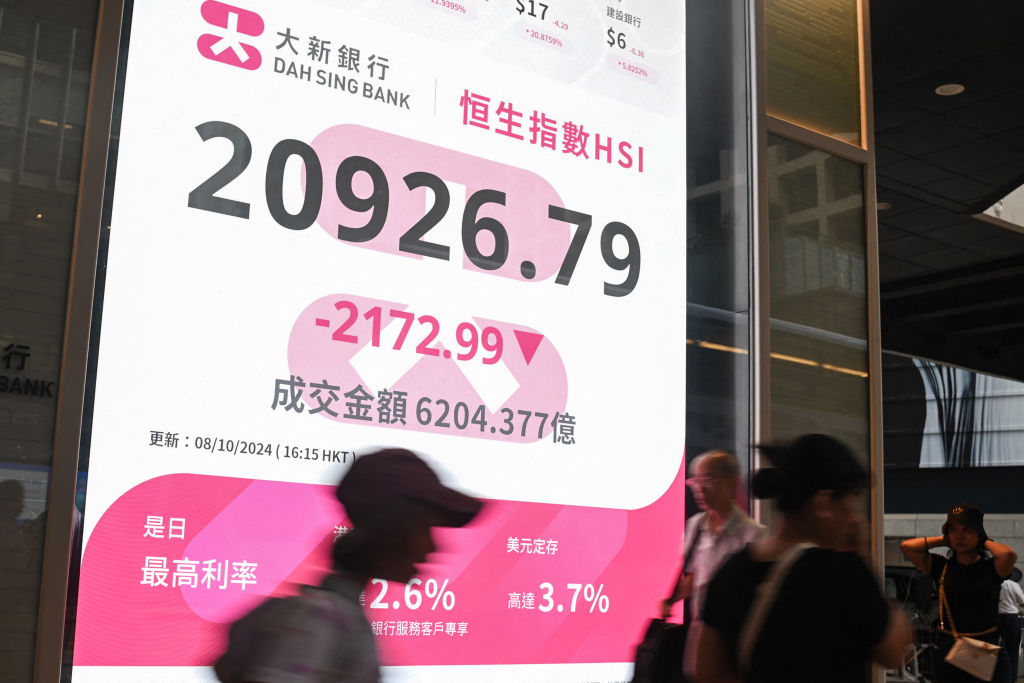China’s stock market plunged on Oct. 9 following a sharp rise in late September induced by the Chinese communist regime’s stimulus policies. The indexes of China’s three major exchanges—Beijing, Shanghai, and Shenzhen—continued to fluctuate without recovering on Oct. 10.
China’s benchmark CSI 300 index—the top 300 stocks traded on the Shanghai Stock Exchange and the Shenzhen Stock Exchange—closed down by 7.1 percent, marking the biggest single-day drop since early 2020 when the COVID-19 pandemic began.
Nearly 5,000 stocks on the Shanghai, Shenzhen, and Beijing stock markets fell, with more than 3,000 falling by more than 9 percent, and 854 companies hit the daily loss limit.
The Shanghai Composite Index fell by 6.62 percent; the Shenzhen Component Index fell by 8.15 percent; and the ChiNext Index fell by 10.59 percent.
Before the stock market’s opening on Oct. 10, China’s central bank announced that its “securities, funds, and insurance companies swap facility” would be immediately implemented to encourage institutions to invest in the stock market. In response, the Shanghai Composite Index rose by nearly 3 percent, at one point hitting 3,350, but fell again in the afternoon to 3,301 at the close.
In late September, the Chinese regime poured 800 billion yuan (about $113 billion) into China’s capital market, spurring a sharp rise in its stock markets. Since that time, however, major funds in the Shanghai and Shenzhen stock markets have begun to flee.
According to Chinese media, a single-day net outflow of 169.8 billion yuan (about $24 billion) was recorded on Oct. 8. More than 100 companies have announced plans to reduce their holdings, and more than 30 listed companies announced plans to reduce their holdings on Oct. 8 alone.
Sun Kuo-hsiang, a professor of international affairs and business at Nanhua University in Taiwan, told The Epoch Times on Oct. 11 that the Chinese stock market’s rollercoaster performance shows that the Chinese Communist Party’s (CCP) new round of economic stimulus policies didn’t achieve the expected results.
“The withdrawal of capital from large investors may be one of the factors [in the stock market’s plunge],” Sun said. “They have more market information and resources and are able to withdraw funds quickly before market fluctuations.”
Sun said that the Chinese stock market fluctuation is likely the market’s reaction to the uncertainty of the CCP’s economic policies and the deterioration of the global market environment.
“Factors such as the global economic slowdown, intensified geopolitical risks, and rising U.S. interest rates have further suppressed the potential of China’s stock market and economic recovery,” Sun said.When stocks were rising, new individual investors—including those in their 20s and 30s—flooded into the market. Many individual investors saw the lowered interest rates on loans and used loans to speculate in stocks.
As a result, Sun said that with a large number of young investors and loan speculators losing money, “social dissatisfaction is likely to rise,” and “may raise doubts about the government policies.”

Xu Zhen, a senior professional in China’s capital market, told The Epoch Times on Oct. 11 that one of the reasons for the recent stock market dive may be the massive sell-off of previously locked-in stocks. He estimated that the market will stay in the range of 3,200 to 3,600 points for a while, and advised against individual investors engaging in leverage trading in this range.
“The stock market’s rise is short-lived and the Chinese economy continues to be depressed,” Xu said. “Compared with stock speculation, perhaps doing nothing and saving money is the safest way of life for ordinary people.”
Sun said that borrowing to speculate in stocks is undoubtedly one of the biggest risks.
“Once China’s stock market cannot be effectively stabilized, it may even lead to a large-scale financial crisis,” he said.
“Large fluctuations in the stock market will weaken investors’ confidence in the future of the economy, thereby affecting consumption and investment intentions. The stock market plummet may lead to a decline in consumption, putting additional pressure on China’s already slowing economic growth.”
Sun noted that the Chinese economy is facing structural problems, such as insufficient consumer demand, a real estate crisis, and declining corporate profits, that cannot be easily solved by short-term stimulus policies.
“Overreliance on monetary easing and increased liquidity may once again increase bubbles in the stock and real estate markets. This short-term prosperity is unsustainable, and once the bubble bursts, it will have a profound negative impact on the financial system and economic growth,” he said. “Continued fiscal stimulus could lead to further increases in government debt.”
Xu offered a similar assessment.
“This round of sharp rise and fall of the stock market is a result of the transmission of the economic crisis to the financial sector, as the regime has hoped to save the economy, consumption, and local debt through the rise in stock markets,” he said. “In fact, this is the CCP’s wishful thinking, and the final result is to trigger the financial crisis process.”
Xu predicted that this round of financial crisis will trigger a social crisis.
“When the people’s grievances are focused on the CCP, it will bring down the CCP system,“ he said. ”This is a major trend that no one, including Xi Jinping, can stop.”
Luo Ya and Li Jing contributed to this report.

